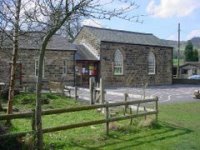Closure Recommended
for Other Schools
At the DCC Cabinet meeting today, the future of the other schools that have undergone a public consultation will be discussed. (Agenda for the meeting)
DCC's web site has the news stories (and the reports being presented to Cabinet):
| Apperknowle Primary | News | Report | |
| Castle Gresley Infant | News | Report | |
| Highfield Primary | News | Report |
Education officers have recommended to the politicians that the schools be closed. In response to the concerns of campaigners at each of the schools, it is said that "Councillors will be told that education officers believe these concerns can be addressed".
If this meeting acts on the recommendations of the education officers, formal notices of closure will be published.
UPDATE 16 Oct, 18:20
The recommendations were unopposed by anyone on the Cabinet, and barely even questioned. As we suspected earlier, it did appear that they weren't bothered.
DCC will now proceed with the formal closure procedure for the three schools.
UPDATE 17 Oct, 11:30
The presentation of the recommendations was said by observers to have contained "trivia", "contradictions" and "cheap shots". We'll post a link to the minutes of the meeting when they're posted on the DCC site, so that you can make up your own mind about that.









.jpg)

